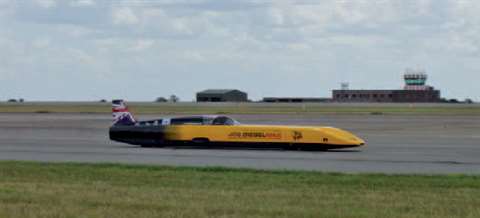Record Breaker
25 April 2008

The Noise of a Diesel Engine is not normally synonymous with land speed records but when the engines are made by JCB and produce 750 hp (560 kW), it's a different matter.
A streamliner car powered by two JCB engines has just entered the record books, reaching 350,09 mph (563,42 km/h), breaking the previous diesel land speed record of 235,75 mph (377,2 km/h) set in 1973.
The concept for JCB's Dieselmax car was the brainchild of the company's chairman Sir Anthony Bamford and was born in 2004, before JCB's 444 engines went into production. Less than two years and several million pounds later, JCB - with the help of racing engine specialist Ricardo and automotive designer Visioneering - has taken the 444 engine from a standing start to over 350 mph (563 km/h).
The Dieselmax car, driven by Wing Commander Andy Green, who also holds the overall land speed record of 735 mph (1176 km/h), recorded its fastest run on 23 August 2006. The setting for the record breaking run was the 9 mile (14,4 km) long Bonneville Salt Flats, Utah in the US and followed extensive testing in the UK. CE met with the JCB team on the final day of testing at RAF Wittering - Wing Commander Green's home airbase - near Peterborough, UK.
Resolving Issues
JCB group engineering director Tim Leverton told CE, “We completed 21 test runs during the two weeks of testing at RAF Wittering, which has allowed us to check and resolve issues with the bodywork, tyres and gearbox and learn how to get the best out of the car.
“The 1,8 mile (2,9 km) runway limited our test speeds to 201 mph (321 km/h) but the tests have showed us that warming up the turbo and tyres is essential to get the car running properly.”
The two JCB444-LSR engines used during the UK testing phase produced up to 600 hp (447 kW) each, which, along with the lack of space, limited the testing speeds. The engines used in the final record breaking run produce 750 hp (560 kW), five times more power than the standard JCB444 engine used in backhoe loaders.
“Initially we tried single, then two stage turbo charging and as a result we have developed advanced technology, particularly in the combustion chamber, which will filter through to JCB products in the next five to 10 years,” said Ricardo's global director of diesel engines Ian Penny.
The JCB444-LSR engine uses the standard 444 block, head, bedplate and valve train but is fitted with stronger springs and different exhaust valves. The crankshaft and camshaft are lightened, while the pistons and connecting rods have been specially designed for the project. The result is a 5 litre engine which produces 750 hp (560 kW) at 3800 rpm at a relatively low compression ratio of 10,5:1 and in excess of 1500 Nm of torque at 2500 rpm.
The carbon fibre body was designed using computational fluid dynamics as a wind tunnel was not fast enough, and using scale models would not give reliable results. The inner frame and chassis are made from 1,5 mm steel box section and feature an aluminium plate over the top to support the turbos and provide access to the engine.
The tyres - Goodyear LSRs - also had to be specially tested as Goodyear only rated them up to 300 mph (480 km/h). “The tyre validation was carried out at an US Airforce base in Ohio which has previously tested tyres for the space shuttle,” said Visioneering engineer John Piper.
Final Preparations
Before Dieselmax was shipped out to the US for further tests during FIA Speed Week at Bonneville, the team were still apprehensive about the difference between Wittering's Marshall asphalt runway and the salt flats.
Speaking to CE before the final attempt Visioneering aerodynamics specialist Ron Ayres said, “The mixing of air and salt after the front wheels could add to the drag. Also, to reach maximum speed the car needs to accelerate just below the limiting friction, and on the salt flats the maximum speed could be limited by the tyres rather than the engine.”
These concerns have now be proven to be unfounded and JCB's Dieselmax car has secured its place in the record books. But how long that record stands remains to be seen.
